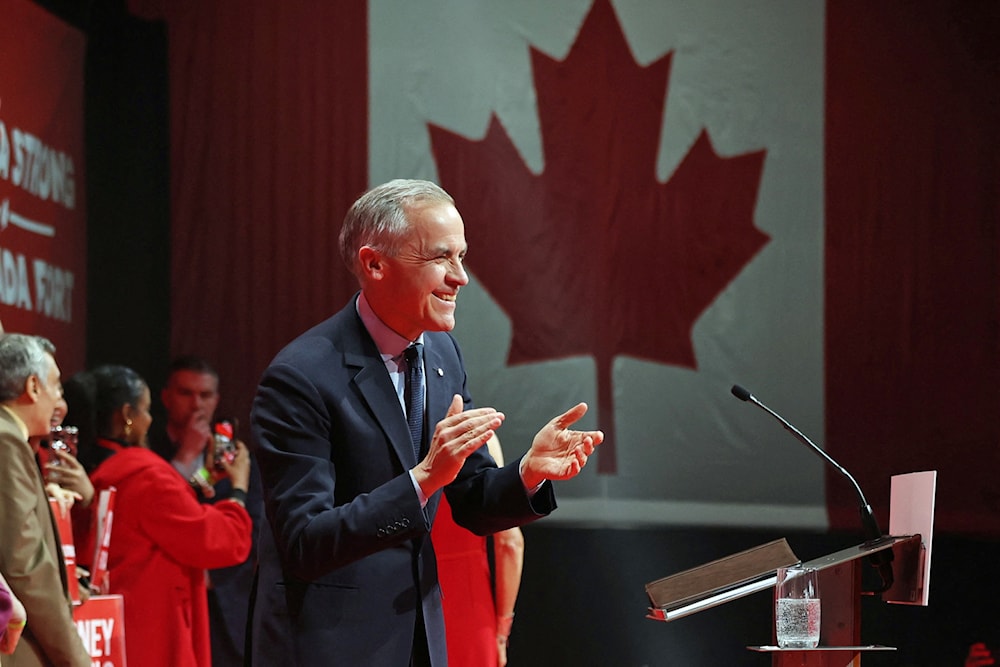Carney leads Canada's Liberals to victory election amid Trump tensions
Media projections suggest Canada's Liberal Party has won a fourth term and is set to form the country's next government.
-

Canada's Prime Minister and Liberal Party leader Mark Carney celebrates at a victory party in Ottawa, Ontario on April 29, 2025. (AFP)
Prime Minister Mark Carney won Canada's election on Monday, with local media projecting a victory that grants his Liberal Party a new term in power.
Carney convinced voters that his extensive experience managing economic crises positioned him best to confront US President Donald Trump.
The public broadcaster CBC and other outlets projected that the Liberals would form Canada's next government, though it remained unclear whether they would secure a parliamentary majority.
Conservative leader Pierre Poilievre fell short of becoming prime minister, although his party appeared poised to form a strong opposition.
Carney, who had replaced Justin Trudeau just a month earlier, focused his campaign on an anti-Trump message, appealing to Canadians concerned about Canada-US relations and Trump's trade war threats.
Previously serving as central bank governor in Britain and Canada, Carney presented himself as a leader equipped to guide the country through economic and geopolitical challenges.
His campaign emphasized expanding overseas trading relations to reduce Canada's reliance on the United States.
After his Liberal Party won control of parliament, Carney said his country should "never forget the lessons" of the United States' "betrayal," in a stark rebuke of Trump.
"We will win this trade war," Carney told cheering supporters in Ottawa, while warning of "challenging" days ahead brought on by Trump's tariffs and annexation threats.
"We are over the shock of the American betrayal, but we should never forget the lessons," Carney said.
The Trump influence
Tensions between Canada and the United States under Trump played a significant role in the election. Trump's threats to annex Canada, renewed in an election-day social media post, deeply outraged Canadians.
Carney's sharp depiction of Trump resonated with voters: "Donald Trump wants to break us so America can own us," he said during the campaign.
"They want our resources, they want our water, they want our land, they want our country. They can't have it."
At the Liberal watch party in Ottawa, celebrations broke out when CBC announced the projection.
Liberal lawmaker and cabinet member Steven Guilbeault emphasized that Trump's repeated attacks on Canada's economy and sovereignty mobilized voters, telling CBC, "I think they saw in Prime Minister Carney someone who has experience on the world stage."
The resignation of Justin Trudeau marked a pivotal shift in Canadian politics. On January 6, when Trudeau announced his resignation, Conservatives led Liberals by more than 20 points in most polls, fueled by voter anger over soaring costs after Trudeau's decade in office.
Carney, 60, successfully distanced himself from Trudeau throughout the campaign, criticizing the former prime minister's economic focus and scrapping a controversial carbon tax. These moves, coupled with nationwide unease about Trump, helped secure the Liberal Party victory.
Read more: Canada’s Carney declares 'end of US partnership' amid tariff clash
Opposition leader Poilievre concedes defeat, congratulates Carney
Conservative leader Pierre Poilievre conceded defeat, congratulating Prime Minister Mark Carney on his projected election win.
Despite the setback, Poilievre indicated he would continue to lead the party, highlighting gains of over 20 seats and achieving the highest Conservative vote share since 1988.
"It will be an honour to continue to fight for you and be a champion for your cause as we go forward," Poilievre told supporters.
He promised to work with the Liberal government in countering Trump's trade war and annexation threats.
"We will always put Canada first," Poilievre told supporters, adding, "Conservatives will work with the prime minister and all parties with the common goal of defending Canada's interests and getting a new trade deal that puts these tariffs behind us while protecting our sovereignty."
Nearly 29 million Canadians were eligible to vote across the vast G7 country, with a record 7.3 million casting advance ballots.
Final results on the composition of Canada's 343-member parliament were still pending, with 172 seats required for a majority. While the Liberals secured a majority in 2015, they had governed with a minority since 2019.
Elizabeth May retains Green Party seat amid struggles
Green Party co-leader Elizabeth May, who had faced concerns about losing her seat, is now projected to win in her riding of Saanich-Gulf Islands with 43%.
Despite this victory, the party's national performance remains weak, with early results showing MP Mike Morrice trailing in second place in Kitchener Centre and co-leader Jonathan Pedneault receiving only 10% in Outremont.
Pre-election polls had placed the Green Party at around 2%, its lowest level in recent years, sparking fears that it would struggle to defend its parliamentary presence.
Jagmeet Singh steps down as NDP leader after defeat
On his part, Jagmeet Singh announced he would step down as leader of the New Democratic Party (NDP) after losing his seat in Burnaby Central.
Addressing supporters, Singh congratulated Carney and emphasized the importance of protecting Canada "from the threats of Donald Trump." He will remain in his position until a new leader is chosen.
Australia's prime minister weighs in
Australian Prime Minister Anthony Albanese commented positively on the results, praising Carney for standing up for Canada's national interests.
"Mark Carney has stood up for national interests, just as I stand up for Australia's interest," Albanese said, highlighting the strong relationship between Australia and Canada.
Read more: US products shunned as 'Buy Canadian' movement grows

 5 Min Read
5 Min Read









